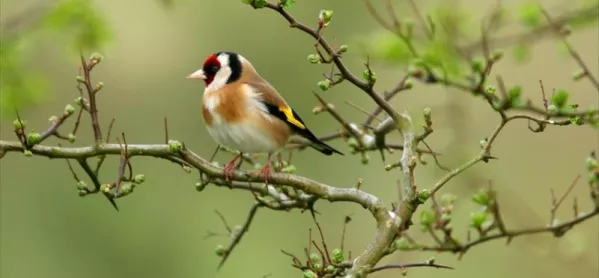Take a walk on the wild side

“Just listen,” says S6 pupil Stuart Bence, member and shining light of Hamilton Grammar’s eco group. “What can you hear? That’s a great tit going now. And look, coming towards us: two oystercatchers. There are brown hares in the field and plenty of buzzards about. But, of course, it’s nice weather for them.”
The TESS is on a nature walk with the group, led by Stuart who is, according to Sinclair Dyer, head of the school’s science faculty, an “encyclopaedia” that you “can’t shut up”. It is an introduction that Stuart is at one with and proceeds to live up to, but his true expertise lies in identifying British birds, he confides. Hamilton Grammar is one of the few secondaries in the country to have gained two green flags from Eco Schools Scotland for their environmental work and is currently working towards its third. They sent off their application earlier this month and, if it is successful, they will be just the second high school in Scotland to secure the award (Portobello High in Edinburgh received its third green flag last year). “The main problem secondaries have is that there is always litter, but it just has to be fought against,” says Stuart. In the past the group has built up and tended its own garden. It has even carried out a study of the wild plants growing in the school grounds and published the findings online. “So far, we’ve found 200 species, many of which are not native to Britain,” reports Stuart. Hamilton Grammar, however, is destined for modernisation and building work has begun at the school, meaning the group’s access to the grounds are now restricted. But the group is too busy to mourn their passing. They are throwing themselves into the school’s redevelopment, drawing up plans for a nature trail that takes in one of the school’s meadows and its patch of woodland. The trail will have fitness stations and will be easily accessible for those with additional support needs. In addition there are grand plans for an organic garden when they get their own patch of earth back. This year, South Lanarkshire Council has also set the eco group the challenge of monitoring the school’s energy consumption. “The information from the group will be used to direct policy in South Lanarkshire,” explains Mr Dyer. Meanwhile, they are continuing to take their passion for nature beyond their own school gate. This week, they were running a twilight session for South Lanarkshire teachers, outlining their work. Mr Dyer says: “They have real difficulty getting secondaries to go for green flags and get involved. The kids will just be talking about what they have done and how they have done it.” Local primary and nursery schools continue to benefit from their visits. When there, they help the children make the most of their outdoor spaces, teaching them about composting and taking them on nature walks similar to the one experienced by The TESS, when the wildlife on their doorstep is explored, mini-beasts are examined with magnifying glasses and interesting facts, such as how to pick up a nettle up without being stung, are shared. “These kids are not the type who naturally put themselves forward but they will stand up in front of a class and do their stuff,” says Mr Dyer. Hollandbush Nursery pupils have been enthusiastic participants. The eco group has also helped the nursery children revamp their garden by building a sensory and a bog garden and painting murals to brighten up the space. “Our little ones have enjoyed working with the older children from the Grammar,” says Margo Butcher, headteacher of Hollandbush. “What they have learnt about insects, bugs and beasties is just fabulous. Teenagers often get a bad press but these youngsters have helped us develop our grounds and garden.” The eco group has faced its share of challenges. They have waged war against vandals - their poly-tunnel was regularly slashed and then finally burnt down. And members have learnt to tune out insults such as “eco geeko”, occasionally hurled by their less green-fingered peers. But they remain undeterred. The group’s membership has risen as high as 60 and now their reach even extends abroad, through their work raising funds for an African orphanage. Alastair Seaman, programme manager at Grounds for Learning, which is dedicated to helping schools develop their outdoor spaces, describes the Hamilton Grammar group as “truly inspiring”. He wants to see far more schools making good use of outdoor spaces and calls for “meaningful government action to promote and encourage the development of outdoor spaces”. The outdoors should be part of initial teacher education, he argues. School inspectors should take more notice of the quality of the outdoor environment and of its use, and when new schools are built the quality of the grounds should be made a priority. “Over the past seven years, Pounds 3.9 billion has been spent on building new Scottish schools, yet many pupils are being deprived of space for physical activity and fun in their break time. We’re waking up to the reality that opportunities for outdoor play are shrinking and kids are spending too much inactive time in front of computer screens. The design of our new schools needs to help tackle these issues, rather than reinforce them.” www.gflscotland.org.uk; http:web.ukonline.co.ukhamiltonbiologybotanyintro.htm.
Keep reading for just £1 per month
You've reached your limit of free articles this month. Subscribe for £1 per month for three months and get:
- Unlimited access to all Tes magazine content
- Exclusive subscriber-only stories
- Award-winning email newsletters



